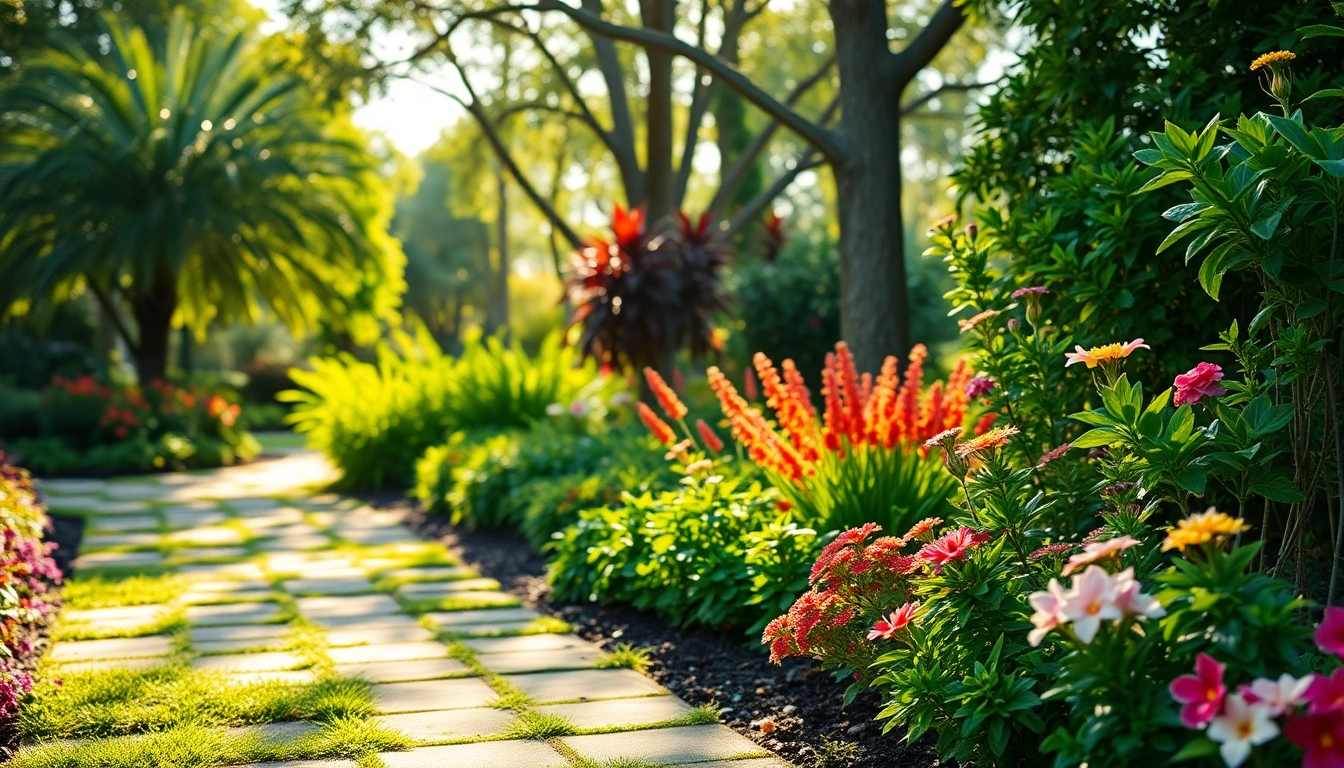Understanding Commercial Landscaping Services
Commercial landscaping encompasses a wide variety of services aimed at enhancing and maintaining the outdoor spaces of commercial properties. It involves the beautification and upkeep of areas like office parks, retail centers, and institutional buildings. Having a well-maintained landscape is crucial not only for aesthetic appeal but for attracting customers and ensuring a positive environment for employees. The right commercial landscaping contractors can make all the difference in achieving this goal.
Definition and Scope of Commercial Landscaping
At its core, commercial landscaping refers to any gardening or landscaping work performed on commercial properties. This includes everything from basic lawn care to sophisticated design and installation projects involving plants, water features, and hardscaping. Commercial landscapes must be functional, appealing, and in line with the brand image of the business. Services can range from landscape design and installation to ongoing maintenance, irrigation management, and seasonal enhancements.
Key Differences Between Commercial and Residential Landscaping
While both commercial and residential landscaping share many similarities, there are distinct differences between the two. Commercial landscaping typically focuses on larger scale projects that require meticulous planning and collaboration with various stakeholders. Here are some key differences:
- Scale: Commercial landscaping projects tend to be larger, involving expansive areas that require careful planning and execution.
- Aesthetics vs. Functionality: While aesthetics is vital, commercial landscaping must also prioritize functionality, such as safety and accessibility for a larger number of people.
- Regulation Compliance: Commercial properties must adhere to local regulations and zoning laws more strictly than residential properties, which influences design decisions.
- Maintenance Requirements: Commercial landscapes often have diverse requirements based on foot traffic, the nature of the business, and specific seasonal needs.
Benefits of Professional Commercial Landscaping
Investing in professional commercial landscaping services offers numerous benefits:
- Enhanced Property Value: A well-maintained landscape can significantly increase a property’s visual appeal and value.
- Improved Employee Morale: Beautiful outdoor spaces enhance the work environment, fostering a positive atmosphere and potentially boosting productivity.
- Attraction of Clients: First impressions matter—landscaping can be a significant factor in how a business is perceived by customers and clients.
- Environmental Benefits: Professional landscaping can incorporate sustainable practices, helping to manage water usage and promoting biodiversity.
Choosing the Right Commercial Landscaping Contractors
Selecting the right contractor for your commercial landscaping needs is critical to the success of your project. The wrong choice can lead to aesthetic problems, compliance issues, or an unsatisfactory return on investment.
Factors to Consider When Hiring
When looking for commercial landscaping contractors, consider the following factors:
- Experience: Look for contractors with a proven track record in handling projects similar to yours.
- Portfolio: Review their previous work to assess their style, creativity, and execution.
- Customer Reviews: Check online reviews or ask for references to gauge the satisfaction of previous clients.
- Services Offered: Ensure the contractor provides a comprehensive range of services that fit your specific needs, from design to maintenance.
Evaluating Contractor Reputation and Experience
A contractor’s reputation often paints a clear picture of what you can expect. Research potential contractors through various platforms—check their website, read customer testimonials, and look at social media feedback. Additional sources include:
- Professional Associations: Membership in professional landscaping associations can indicate credibility and commitment to industry standards.
- Certifications: Specialized training or certifications in landscaping, horticulture, or environmental practices enrich a contractor’s qualifications.
Checking Licenses and Insurance
Valid licenses and insurance are non-negotiable indicators of a reputable commercial landscaping contractor. Confirm that the contractor has appropriate licenses to operate in your locality and holds liability insurance to protect you from potential financial risks arising from accidents or damage during landscaping work. Additionally, workers’ compensation insurance is essential for safeguarding against injuries sustained by contractors’ employees on your premises.
Cost Factors for Commercial Landscaping Projects
The cost of commercial landscaping can vary significantly based on several factors, including the complexity of the project, the size of the area, and the services required. Understanding these elements can help you budget effectively.
Typical Pricing for Landscaping Services
On average, commercial landscaping costs can range between $2 to $10 per square foot, depending on the region, material choices, and project specifics. For instance, basic lawn maintenance services will typically fall on the lower end of this scale, while extensive design projects or specialized installation of features such as water elements will be on the higher end. Other considerations include:
- Plant Selection: The choice of plants can significantly affect project costs. Native plants may reduce costs and are better for sustainable landscaping.
- Seasonal Requirements: Certain times of year may lead to higher costs or different service needs based on weather conditions.
- Labor Costs: Regions with a higher cost of living often translate to higher labor costs, impacting overall project expenses.
Understanding What Influences Landscaping Costs
Several factors can affect the overall cost of your commercial landscaping project. Some include:
- Size of the Property: Larger areas require more materials, labor, and logistics, thus increasing costs.
- Project Complexity: Complex designs requiring specialized skills or materials will naturally increase project estimates.
- Site Condition: Pre-existing conditions, such as soil quality or terrain challenges, can complicate efforts and influence costs.
Budgeting Tips for Effective Landscaping Solutions
Effective budgeting can facilitate successful landscaping projects. Consider the following tips:
- Get Multiple Quotes: Obtain estimates from several contractors to encourage competitive pricing.
- Prioritize Needs: Focus your budget on essential areas first, saving ornamental features for later stages.
- Plan for Maintenance: Factor in not just installation costs but ongoing maintenance to ensure your investment is protected in the long run.
Trends in Commercial Landscaping
As with any industry, commercial landscaping is evolving with new trends and practices. Keeping abreast of these changes can help businesses remain competitive and relevant.
Emerging Sustainable Landscaping Practices
Environmental sustainability is becoming a critical aspect of commercial landscaping. Many contractors are now incorporating eco-friendly practices, such as:
- Native Plant Use: Selecting plants that thrive in local climates reduces the need for excessive watering and care.
- Water Management: Implementing rain gardens, permeable pavement, and efficient irrigation systems to minimize water waste.
- Organic Practices: Utilizing organic fertilizers and pest management strategies can promote healthier landscapes without harsh chemicals.
Innovative Design Concepts in Commercial Spaces
Modern commercial landscapes are increasingly embracing innovative design elements. Popular trends now include:
- Functional Outdoor Spaces: Business landscapes are being designed for functionality, creating outdoor spaces for meetings, relaxation, and social interaction.
- Vertical Gardens: Limited space can be addressed by utilizing vertical designs, enhancing aesthetics while improving air quality.
- Smart Landscape Technologies: The integration of technology in landscaping—such as automated irrigation systems—promotes efficiency and oversight.
Technology and Tools in Modern Landscaping
The use of technology is transforming commercial landscaping, enhancing both design and maintenance processes. Important tools include:
- Drones: Used for site analysis, surveying, and design visualization.
- Landscape Design Software: Helpful for creating realistic 3D renderings of projects before any physical work is done.
- Irrigation Technology: Smart irrigation systems that automatically adjust based on real-time weather data, enhancing water conservation practices.
Building Long-Lasting Relationships with Landscaping Contractors
Establishing strong relationships with commercial landscaping contractors can yield the best long-term results. Solid partnerships can help ensure that your landscapes will continue to thrive and meet your evolving needs.
Effective Communication Strategies
Clear communication is foundational to success in any project. Consider these strategies for effective engagement:
- Regular Updates: Schedule meeting times for updates on progress, challenges, and changes to plans.
- Set Clear Expectations: Ensure all parties understand what is expected in terms of deliverables, timelines, and quality standards.
- Feedback Mechanisms: Establish a reliable way to provide feedback on work completed to foster a culture of improvement.
Maintaining Contracts for Ongoing Maintenance
A well-defined maintenance contract is crucial for ensuring the longevity and health of commercial landscapes. Key considerations include:
- Periodic Assessments: Regular evaluations can help address potential issues before they become major problems.
- Service Frequency: Determine how often services like mowing, fertilizing, and pruning will be necessary, adjustable based on the season.
- Communication of Needs: Open lines of communication regarding your needs will help contractors adjust their service to meet your expectations.
Maximizing ROI Through Quality Landscaping
Investing in quality landscaping can yield impressive returns. Here are strategies to maximize your investment:
- Invest in Quality Materials: Utilizing higher-quality plants and materials can ensure better longevity and lower replacement costs down the line.
- Track Maintenance Costs: Keeping a detailed record of maintenance costs can help identify patterns and areas for cost savings.
- Promote Your Landscape: Use professional photography for promotional materials to attract new business and highlight your property’s design and maintenance.







